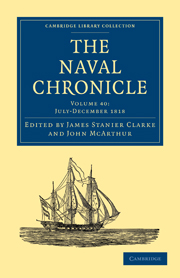 The Naval Chronicle
The Naval Chronicle Book contents
- Frontmatter
- PLATES IN VOLUME XL: From Original Design
- PREFACE TO THE FORTIETH VOLUME
- BIOGRAPHICAL MEMOIR OF SIR JOHN JENNINGS, REAR-ADMIRAL OF ENGLAND
- BIOGRAPHICAL MEMOIR OF SIR ROBERT HOLMES, REAR-ADMIRAL OF THE RED
- BIOGRAPHICAL MEMOIR OF THE LATE JAMES HINGSTON TUCKEY, CAPTAIN R.N.
- BIOGRAPHICAL MEMOIR OF THE LATE JAMES HINGSTON TUCKEY, CAPTAIN R.N.
- BIOGRAPHICAL MEMOIR OF CAPTAIN JOHN TOUP NICOLAS, OF THE ROYAL NAVY. C.B. K.C. St. F. & M.
- BIOGRAPHICAL MEMOIR OF CAPTAIN JOHN TOUP NICOLAS, OF THE ROYAL NAVY. C.B. K.C. St. F. & M.
- INDEX
BIOGRAPHICAL MEMOIR OF THE LATE JAMES HINGSTON TUCKEY, CAPTAIN R.N.
Published online by Cambridge University Press: 10 January 2011
- Frontmatter
- PLATES IN VOLUME XL: From Original Design
- PREFACE TO THE FORTIETH VOLUME
- BIOGRAPHICAL MEMOIR OF SIR JOHN JENNINGS, REAR-ADMIRAL OF ENGLAND
- BIOGRAPHICAL MEMOIR OF SIR ROBERT HOLMES, REAR-ADMIRAL OF THE RED
- BIOGRAPHICAL MEMOIR OF THE LATE JAMES HINGSTON TUCKEY, CAPTAIN R.N.
- BIOGRAPHICAL MEMOIR OF THE LATE JAMES HINGSTON TUCKEY, CAPTAIN R.N.
- BIOGRAPHICAL MEMOIR OF CAPTAIN JOHN TOUP NICOLAS, OF THE ROYAL NAVY. C.B. K.C. St. F. & M.
- BIOGRAPHICAL MEMOIR OF CAPTAIN JOHN TOUP NICOLAS, OF THE ROYAL NAVY. C.B. K.C. St. F. & M.
- INDEX
Summary
With one sad sigh for thee our bosoms heave,
And with the bay we now the cypress weave.
And O! while valour, virtue, we revere,
Or unsuccessful merit claims a tear,
To thee, Oh Tuckey, we that tear shall give,
And may thy Memory for ever live.
Duncombe paraphrased.[Concluded from page 180.]
THE Calcutta sailed from Spithead in April 1803, arrived at Rio de Janeiro the 1st of June, at the Cape of Good Hope the 16th of August, and at Port Philip the 12th October. Lieutenant Tuckey minutely surveyed that port, and the adjacent coast, and found it totally inelligible for the establishment of the colony. The prominent features of its unfitness were, the difficulty of egress on account of the prevailing winds, the great scarcity of fresh water, and the poverty of the soil. The colonists were, however, landed, and encamped for twelve weeks, and then removed to the river Derwent, on the south coast of Van Diemen's Land, where a settlement, named Hobart, was established. The Calcutta left the colonists to he removed by a transport, and arrived at Port Jackson on Christmas Day to take in a cargo of ship timber. The original intention of allowing Mr. Tuckey to remain six months in the country was frustrated by the renewal of the war, which rendered it necessary for them to return to England with their timber as speedily as possible.
- Type
- Chapter
- Information
- The Naval ChronicleContaining a General and Biographical History of the Royal Navy of the United Kingdom with a Variety of Original Papers on Nautical Subjects, pp. 245 - 332Publisher: Cambridge University PressPrint publication year: 2010First published in: 1818
